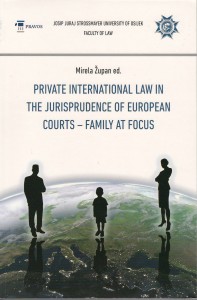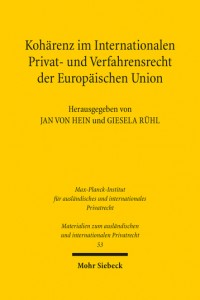The latest issue of the “Praxis des Internationalen Privat- und Verfahrensrechts (IPRax)” features the following articles:
H.-P. Mansel/K. Thorn/R. Wagner, European conflict of laws 2015: Reappraisal
The article provides an overview of developments in Brussels in the field of judicial cooperation in civil and commercial matters from December 2014 until November 2015. It summarizes current projects and new instruments that are presently making their way through the EU legislative process. It also refers to the laws enacted at the national level in Germany as a result of new European instruments. Furthermore the authors look at areas of law where the EU has made use of its external competence. They discuss both important decisions and pending cases before the ECJ as well as important decisions from German courts pertaining to the subject matter of the article. In addition the article also looks at current projects and the latest developments at the Hague Conference of Private International Law.
K. Kroll-Ludwigs, Conflict between the Hague Protocol on the law applicable to maintenance obligations (2007) and the Hague Maintenance Convention (1973): lex posterior derogat legi priori?
On 18.6.2011, the European Union set into force the Hague Protocol on the law applicable to maintenance obligations of 23 November 2007 and established common rules for the entire European Union aiming to determine unanimously the applicable law where debtor and creditor are in different countries. The Protocol replaced the Hague Convention of 2 October 1973 on the Law applicable to maintenance obligations. Due to its universal application, its rules apply even if the applicable law is the law of a non-Contracting State. However, note that non-EU-States, as Turkey, Switzerland, Japan and Albania are not bound by the Protocol. As well as Germany they are Contracting States of the Hague Maintenance Convention. From the German perspective, in relation to these States the question raises whether the rules of the Hague Maintenance Convention still apply. Taking into account that the Protocol – unlike the Hague Maintenance Convention – enables the parties to choose the applicable law, determining the relevant legal instrument is of great practical importance.
F.M. Wilke, The subsequent completion of German judgments to be enforced abroad
Under certain conditions, a German court can pass a judgment without a statement of facts and even without reasons. This can lead to problems abroad if the decision is to be recognized and enforced there. This is why the implementing statute concerning recognition and enforcement (AVAG) contains provisions that cover the subsequent completion of such decisions in light of certain international conventions and, so far, the Brussels regime. After the reform of the German Code of Civil Procedure (ZPO) in light of the Brussels I Recast, however, the scope of application of the AVAG does not extend to the Brussels I Regulation anymore. At first sight, this may seem plausible because of the abolition of exequatur. Yet it might be necessary for a court of an EU member state to examine the facts of a case and/or the reasons behind a decision in order to determine if its recognition/enforcement should be refused (Articles 45, 46 Brussels I Recast). This short article analyses for which cases the legal basis for subsequent completion seems to have vanished and how to deal with them. Essentially, the solutions de lege lata are to bypass the scope of application of the AVAG or to proceed by analogy. In a potential future reform, the respective AVAG provisions simply should be integrated into the ZPO.
S. Kröll, The law applicable to the subjective reach of the arbitration agreement
Defining the parties to an arbitration agreement, in particular whether nonsignatories are bound by the agreement, is one of the pervasive problems in international arbitration. It generally involves a number of conflict of laws questions some of which have been addressed by the German Supreme Court in its decision of 8 May 2014. A party’s reliance on the „group of companies doctrine“ does not relieve the courts from a detailed analysis of the various relationships involved. In most cases, it is the law governing the arbitration agreement which also determines who are the true parties to the arbitration agreement.
M. Weller, No effect of foreign mandatory provisions on arbitration agreements under German law according to § 1030 ZPO
The material scope of arbitration agreements, in particular with regard to tort claims, is a constant point of controversy before state courts. The note on the judgment by the Upper Regional Court Munich identifies opposing trends in German and European case law. The judgment also decides on the (lack of) influence of foreign mandatory provisions, arbitrability according to foreign law and the foreign ordre public on arbitration agreements, subject to German law.
C. Althammer/J. Wolber, Cross-border enforcement of coercive fine orders in Europe and limitation on enforcement
The European Court of Justice ruled in the case of Realchemie Nederland BV./. Bayer CropScience AG that decisions ordering a coercive fine fall within the scope of the Brussels I Regulation. This ruling made the German Federal Court of Justice decide upon the effects of a limitation on the crossborder enforcement of such an order. The judgment of the German Federal Court of Justice reveals a traditional understanding of the international law of enforcement and provokes the question if this approach is still appropriate for cross-border enforcement in Europe, especially as the recast of the Brussels I Regulation abolished the exequatur proceeding. The article examines the effects of obstacles resulting from national law of enforcement on the conditions of cross-border enforceability under the Brussels I and Ia Regulation. In this way the article leads into an issue that has so far not been discussed to a sufficient extent: the relationship between the cross-border enforceability of judgments and the national laws of enforcement.
P. Mankowski, Inhibitions against arrest of ships abroad inside or outside an insolvency context?
Sometimes seemingly technical cases at first instance open up a plethora of questions touching upon basics and fundamentals of international procedural law. Whether a court can inhibit parties from pursuing enforcement or arresting ships abroad in- or outside an insolvency context is precisely such a case. It touches upon the permissibility of measures against enforcement abroad and upon the universality approach in modern international insolvency law. Furthermore, it is inexplicably linked with the question to which extent (registered) ships are to be treated like real estate.
D. Otto, Internationale Zuständigkeit indischer Gerichte bei Markenverletzungen
In its decision of 15.10.2014, the Delhi High Court had to resolve whether it had competence in the international sense for a lawsuit by a U.S.-based claimant without a presence in India against an Indian-based defendant, who had his business in a different state. Under Indian civil procedure rules, a court has jurisdiction in the international sense against a defendant residing within the jurisdiction of the court. As per such rule, claimant would have to litigate before the Bombay High Court, not the Delhi High Court. The Claimant invoked a new legal provision that gives jurisdiction in disputes involving copy right or trademark violations in India also to a court at the place where the claimant carries on business. Claimant argued that it did “carry on business” within the jurisdiction of the Delhi court because its website could be accessed in Delhi. The court accepted that. This Article questions such decision as previous jurisprudence by Indian courts required that an “essential” part of claimant’s business is carried out in India; access to a website alone was deemed insufficient.
F. Heindler, Austrian Supreme Court on Remuneration of Heir Locators
The Austrian Surpreme Court in Civil Matters (Oberster Gerichtshof) has changed its jurisdiction on claims by commercial heir locators. Under Austrian law, according to the Oberster Gerichtshof, commercial heir locators are still entitled to reimbursement for expenses in negotiorum gestio. However, the amount of remuneration is no longer calculated in relation to the heir’s inheritance right.



 Readers of our blog might recall that Jan von Hein and I convened a conference on coherence in European private international law in Freiburg i.Br. (Germany) in October 2014 (see our previous
Readers of our blog might recall that Jan von Hein and I convened a conference on coherence in European private international law in Freiburg i.Br. (Germany) in October 2014 (see our previous